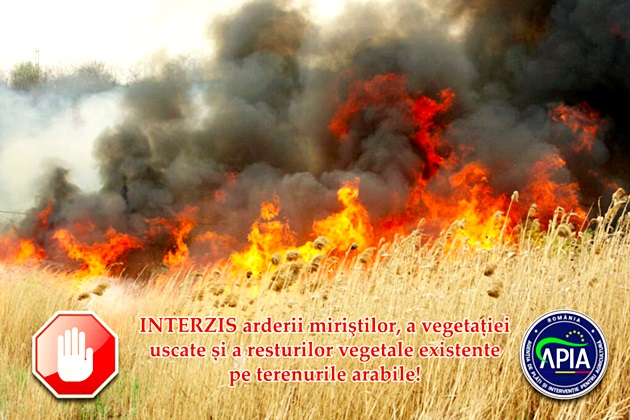851

The Agency for Payments and Intervention in Agriculture (APIA) informs farmers that starting from the application year 2023, the rules regarding conditionality in the form of direct payments and other interventions and measures for rural development will be implemented.
Farmers and other beneficiaries receiving support through the interventions in the 2023-2027 Strategic Plan must comply with the conditionality rules throughout their entire agricultural operation and throughout the application year.
As part of this, Standard GAEC 3 applies to all agricultural holdings and all farmers who have arable land at their disposal. The mandatory requirement is the prohibition of burning stubble, dry vegetation, and plant residues on arable land.
Farmers using arable land, including temporary pastures, must not burn stubble and/or plant residues resulting from crop harvesting (straw from cereals, protein-rich or potato stems, maize cobs, sunflower stalks, rapeseed, etc.), including grass/vegetation left after mowing temporary pastures.
To strengthen verification measures for compliance with Standard GAEC 3, APIA has signed a Collaboration Protocol with the National Environmental Guard (GNM) and the General Inspectorate for Emergency Situations (IGSU). The parties commit to collaborate in order to enhance control actions' efficiency.
APIA, GNM, and IGSU develop informative materials (posters, leaflets, press releases, etc.) regarding the prohibition of burning stubble and dry vegetation on arable land and disseminate them to the county structures of APIA, GNM, and IGSU for public awareness campaigns.
The main objective of Standard GAEC 3 is to maintain the level of organic matter in the soil by prohibiting the burning of stubble, dry vegetation, and plant residues on arable land. Farmers who comply with Standard GAEC 3 contribute to reducing greenhouse gas emissions from agriculture.
In case it is found that a certain area of the farm has been burnt, but the burning is due to unknown causes, farmers can present a copy of the intervention minutes prepared by the county emergency department or a copy of the report filed with the Police department in the area where the incident occurred to the APIA Center where they submitted the application. After completing the investigations, farmers must also present a copy of the resolution document related to the submitted report.
For more information regarding the conditionality rules, please refer to:
Order MADR/MMAP/ANSVSA no. 54/570/32/2023 for the implementation of the rules regarding conditionality in the form of direct payments and other interventions and measures for rural development, starting from the application year 2023.
The farmer's guide to conditionality, available on the APIA website: www.apia.org.ro.




